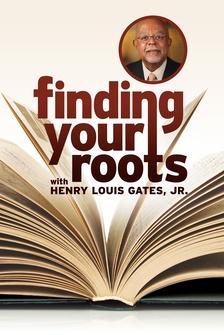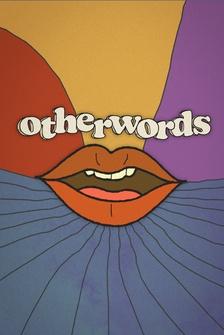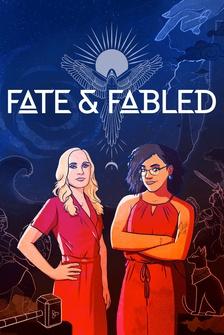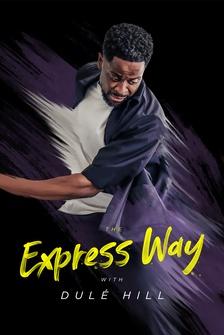(slow piano music) (keyboard clacks) - [Richard] Hi, I'm Richard Osman, and this is "The Last Devil to Die".
It'll make you laugh, it'll make you cry, and it's got a great Agatha Christie-type mystery in the heart of it.
(music turns intriguing) - What is it about older adults that make them so good at solving murders?
- That's a good question, isn't it?
- (chuckles) It is.
Funnily enough, yeah, so the people in my book, as you say, are older adults, they live in a retirement community, so everyone's over 75.
And the truth is, it's based on a real place where my mom lives, and when I used to go down there, you talk to all these older people, who sort of felt they were locked away a little bit and invisible.
And when I was at this community, I thought, this actually would be an amazing place for a murder.
'cause it's so beautiful, you know, it feels like an Agatha Christie set, you know, it's got lakes, and you know, forests and all this kinda stuff.
So perfect setting for murder, and then I was thinking about these people, and I was thinking, you've got every skill needed to solve a murder.
And 'cause they're from that generation who are overlooked, they are invisible, (piano music continues) and yet they're so incredibly wise and experienced, and if you're invisible and wise, then you make an amazing detective.
- I wonder what you get as a reaction from that age group about how you're depicting them.
- Do you know what, I was worried about it, because as I say, I get so much from writing about that generation, so I sort of feel like I'm taking advantage a bit, so their reaction was very important.
And the lovely thing about these books, they're read across the age groups, but older people will always come up and say, thank you for writing about us as real human beings, and not writing about us as, you know, sort of invisible, but also not writing about us as if, aren't we sweet, and lovely, and you know, thank you for writing about us as genuine humans with flaws, but also with abilities, and the desire to have new things and new friendships and new adventures.
So it's been great.
And even where my mom lives, you know, they love it, I go down there, they pitch me murders, you know, you'll go there and someone will say, oh, there's a concert hall on the edge of the village and it's got a very high balcony, and if you push someone off that you'll kill them.
And you think, well, thank you Marjorie, (Jeremy chuckles) that's a plot, I suppose.
- That's right.
That's a dark thing that I hadn't thought about.
Because Oh my God, that's the point, that generation, they've got the darkest, they've been through everything, you know, there's nothing they haven't thought in their lives.
- That's right.
And some of them have witnessed, right?
- Exactly that.
- Atrocities in their lives.
- Exactly that.
(somber music) - [Jeremy] You talked a little bit about that the idea of the setting came from where your mother lives.
- [Richard] Yeah.
- [Jeremy] But were you sitting there looking at these people thinking, man, they would be great at solving crimes.
- I mean, it's exactly that, you know, my whole career has really been in television, and television ideas, and you know, if you want to think about where ideas come from, it's almost always, the way I always think about it, if you are interested in the world and stuff that's going on, there's little bubbles around your head all the time, about 10 different things, something you just see, and something you just read, something, you know, a friend of yours said, and every now and again, two of those bubbles pop into each other and something new happens.
And that's exactly what happened here, the idea of, this would be a great place for a murder, these people would solve it.
And then they had on their notice board in the village, it had like kind of a Tuesday, French Conversation Club, Wednesday, Art History Club, and then in my head I just had that thought, Thursday, Murder Club, (somber music continues) and the first book is called "The Thursday Murder Club", and honestly, I started writing that evening, and I had that thing, there'll be a murder, this older group of very, very unlikely friends, like a sort of older A-Team would get together and do it, and they're called the Thursday Murder Club, and I thought, this is worth a few years of my time.
- Of course the books are thrilling, and they are mysteries, and they are humorous, but I also see that you're exploring the stark reality of the closeness of death to all of us, especially for older people.
So how do you approach that as a writer?
- I think that, again, as I said, I get all the advantages of writing about these people and the mischief, and you know, really, it's very joyous for me to write.
But I can only get that joy if I then, you have to pay a tax on that, which is to tell the truth about what it is to be older.
And many, many things about growing older are wonderful, by the way, as you can tell, there is a freedom, But also, you are around death, you're around grief, you're around infirmity.
And right from the beginning, I've had a big strain through the book about dementia, and it's sort of front and center in this book as well.
And that to me, is that thing of the responsibility of talking about human beings, and who we are as human beings.
And it's all very well saying, oh, we're having wine 11:30, and then we're playing bowls and then we're solving a murder, but you know, we're around bad things.
And both, both my grandparents passed away with dementia, and it's very, very rare to find any family who's not touched with it one way or another, and you know, all dementia tends to be different.
And so I write about it, and you know, three books are sort of falling in love with characters, and so hopefully it's affecting to see it through the eyes of these people we know so well, and Steven, who's Elizabeth's husband, who had dementia, you know, from the first book, and is sort of front and center in this book as well.
But yeah, I just try and treat everyone with respect, and try and imagine what would actually happen.
(somber music resumes) - Of course, you're never gonna choose your favorite character, 'cause that's impossible, but of all your heroes, Elizabeth, Joyce, Ron, Abram, is that correct?
- Ibrahim, yeah.
- Ibrahim is how you pronounce it.
Which one is your favorite to write?
- Ah, that's such a good question.
So there's a diary in the book, which is written by Joyce, and every sort of five or six chapters, Joyce writes a diary.
And that's the bit, if ever, and you'll know those days where you think, I cannot write today, you'll sit in front of your machine, and you'll be like, I know the scene I have to write, okay, I know the guy's gotta get the gun and then he's gotta sort of get his way across town, I cannot do it.
And on those days, I sit down, I write Joyce at the top of a bit of paper, and I just do stream of consciousness, 'cause Joyce's diary is, she's watching TV, she's having some food, she's worrying about her daughter.
- She's discovering Tinder.
- She's discovering Tinder, that's exactly right, and she's got her own Instagram account, all this stuff.
But also, she's then dropping a little clue to the murder, and you don't notice because you think she's being charming.
So she, I find, it flows, because she writes very, she thinks very stream of consciousness.
But by and large, you know, whenever there's a scene I think whose point of view would it be sort of most amusing, or most unusual to view this scene through.
And so, certain scenes really play into, you know, Ibrahim I love to write 'cause he's very correct, and you know, likes to make lists, and then he likes to laminate those lists, and that's fun.
And Elizabeth, of course was a former spy, and so if ever there's, I love sending her in to deal with like, you know if you have to go to the DMV or something, you know, if you've just got some problem with your broadband or something like that, I love Elizabeth to go in there, I love to send a former spy.
- She's your girl.
- Exactly that, yeah.
- And Ron, of course, I mean for me, Ron is like, sometimes the unsung hero, because he is a little bit brutish, he's the heavy, you know, the way that I imagine him, but just a kind soul.
- Yeah, he's great, I mean he's slightly based on my grandfather who was a cop for many, many years.
And my granddad, I mean, he swore like a trooper, you know, he was very, very funny, but incredibly kind.
So really, really tough, like a tough guy, you would not mess with him, but you know, he'd give you his last penny.
And that to me is a certain strain of masculinity which my grandfather represented, and which Ron represents as well.
And he's funny, he makes me laugh as well.
- He's funny, he's so funny.
(intriguing music) So you may face the reality at some point of having one of your fabulous four die.
- Yeah, honestly, I think that's a long way off.
I always say, it's like having a car with three wheels, I don't think I could do it.
- I don't think you can.
- But then how would I choose?
- And I don't think your readers will forgive you.
- I think that's right.
And also, I think, listen, however much I wanna say, it's real life, and I try and tell the truth.
It's also books, it's also entertainment, and it's also joy.
And you know, I recognize the joy these four bring me, and bring readers as well, and I think I'm allowed to just sort of spread that out for as long as I want to.
(intriguing music resumes) - You've certainly heard of Only Murders in the Building.
- Yes, yes.
- Huge show in the United States.
Of course, older adults are solving murders.
It's wildly popular, so are your books.
Then of course we have Murder She Wrote, right?
And the TV show Murder She Wrote.
- One of the classics.
- Why is this almost like a sub genre that's become so popular?
- It's interesting, isn't it?
Because also we can go back to Miss Marple.
- Of course.
- In the UK.
And you know, I do think, when I first was selling this book, and when I started writing this book, every book was like a dark psychological thriller.
It was that time, there were girls on trains, and unreliable narrators and stuff like that.
By the way, there's some brilliant novels in that genre.
- Brilliant, yeah.
- But if you're writing a novel, it's not gonna come out for four years, so there's no point writing what everyone else is writing.
I just had this thing, but you know, when I started selling it, people would go, "Really, about four older people?," and, "You sure that's gonna sell?"
But all the smart people in publishing immediately went, "It's great, this works for us brilliantly."
Marple worked for us, as you say, Jessica Fletcher works for us.
You know, it is that combination of wisdom, and like, if you watch Only Murders in the Building, you know, Martin Short and Steve Martin sort of get away with anything, 'cause they don't have to get up in the morning to feed the kids, you know, literally, they can do what they want at any given time.
And that's a really fun thing to write.
And everybody in the world is either older, or is going to be older at some point, so everyone's either thinking about their life in old age, or what they would like their life to be in old age.
And if you can set up some lovely role models for people, you know, the place where the gang live in the "Thursday Murder Club" books, and the characters themselves, so many people say, please let me live there when I'm 75 with my friends, I would love to do that.
And you know, who wouldn't wanna be Steve Martin and Martin Short, in that lovely building, and you know, they don't really have much to do, and then they've got a lifetime of experience.
And so, you know, Jessica Fletcher, I mean she doesn't need money, does she?
Jessica, she's made all that money.
You know, just goes around and sees various nephews and someone gets murdered.
(intriguing music) - Richard, thank you so much for doing this.
- Thank you Jeremy.
He's always been my literary hero.
(Jeremy chuckles) - And thank you for watching A Word on Words.
I'm Jeremy Finley.
Remember, keep reading.
(bell dings) - [Richard] These four characters, they will open any door, they will talk to anyone, they will try anything, and it's naturally, they make me laugh so much by the way they approach life, and it's the way I wish I could.








